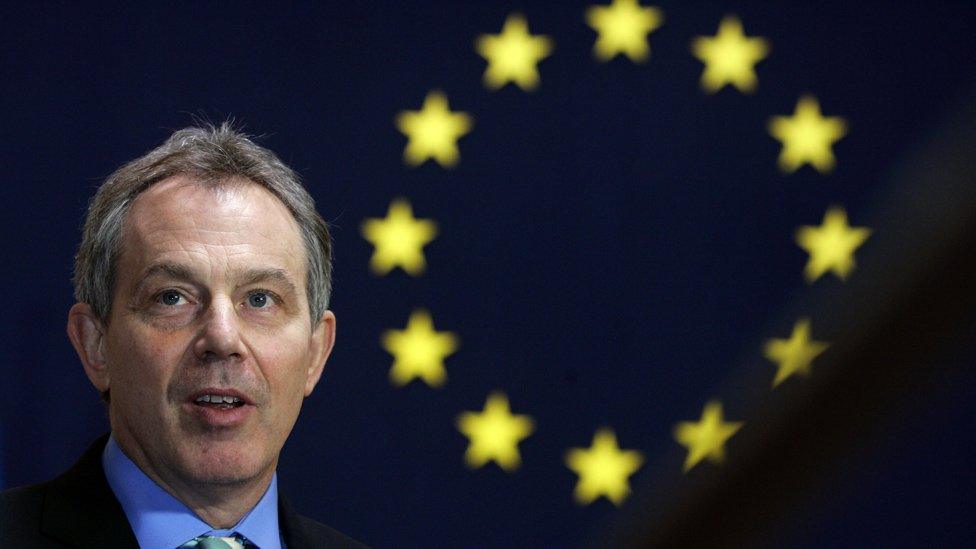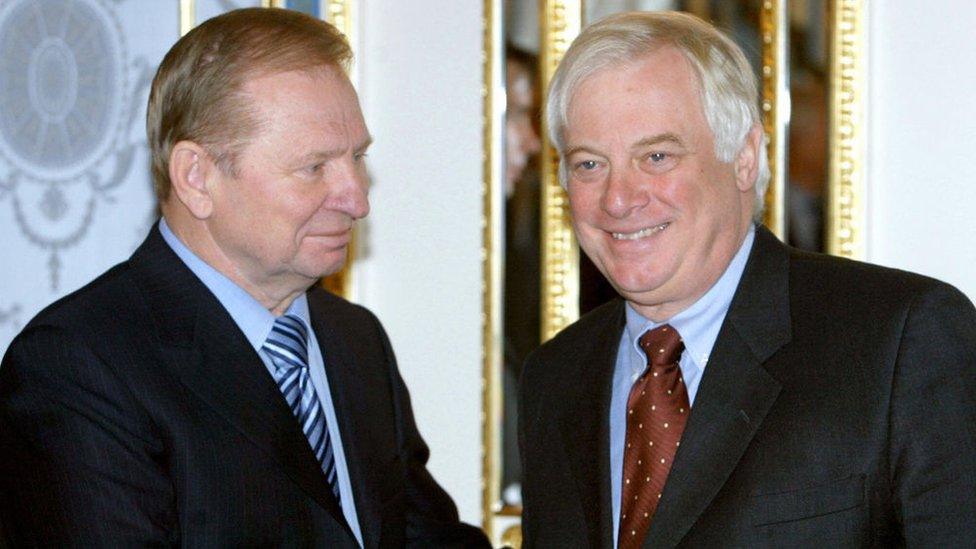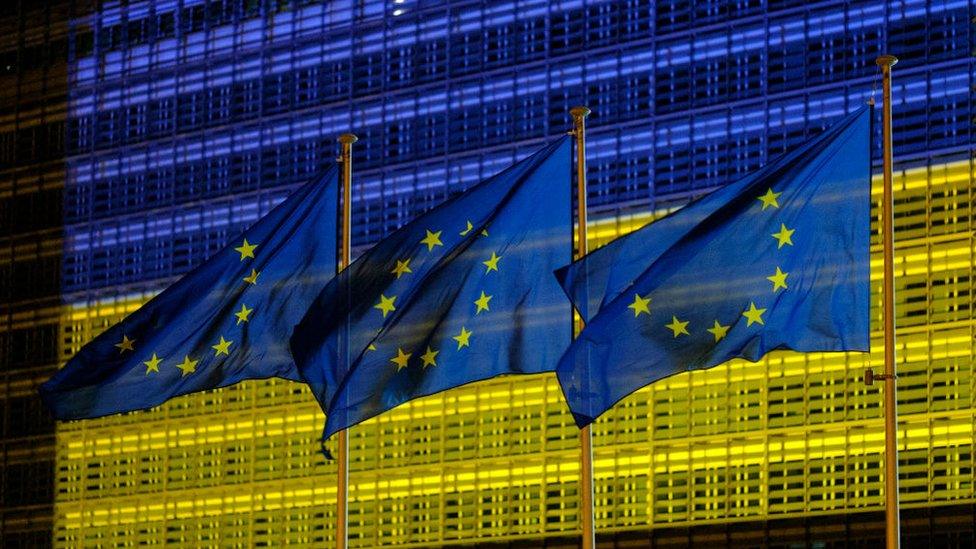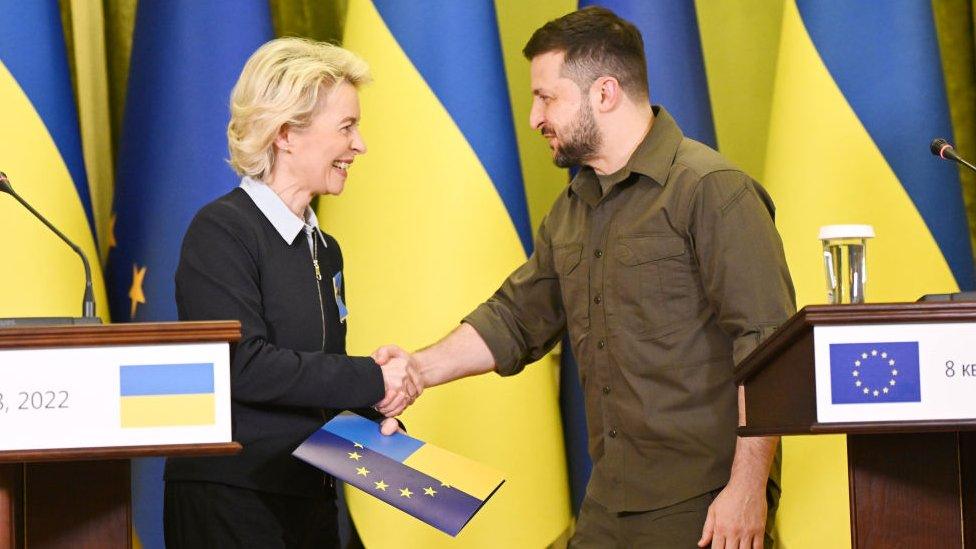Tony Blair was urged to back Ukraine's EU dream in face of Russia threats - records
- Published

Ukraine's then-president described Tony Blair as a "sincere friend" of his country in the archived documents
Tony Blair was urged to back Ukraine's dream to join the EU to form a barrier against Russian threats, newly released records from his time as PM show.
His special Europe adviser told him Kyiv wanted a "special relationship... if only we would show more interest," the National Archives reveal.
Ukraine's then-president, Leonid Kuchma, also wrote to Mr Blair appealing for his support.
The EU finally granted Ukraine candidate status last year.
But Nato has refused to give Kyiv a timeline for membership.
According to the documents dating back more than 20 years, Mr Kuchma appealed directly to then-prime minister Mr Blair to back Ukraine's long-term goal of "full-scale European and Euro-Atlantic integration, including the full-fledged EU membership".
It had been barely a decade since Ukraine gained independence in 1991 and President Kuchma, in power since 1994, added in a handwritten note that he pinned great hopes on Mr Blair, as a "sincere friend" of Ukraine... on your personal support in this exceptionally important issue".
Mr Kuchma had first declared Ukraine's intention to join the EU in 1998, but there was little enthusiasm for it in Germany or France. One of the biggest stumbling blocks was that Ukraine was beset with corruption and its businesses run by powerful oligarchs.
For all his Western leanings, Mr Kuchma's own government was tainted by the gruesome 2000 murder of a journalist, Georgiy Gongadze, who was one of the Ukrainian leader's biggest public critics. Mr Kuchma has always denied complicity in his death.
According to the newly released documents, Roger Liddle, who served as an adviser to Mr Blair on European affairs, said immediate EU or Nato membership was unlikely but he urged the prime minister to become more engaged.
After July 2001 talks in Crimea, 13 years before it was seized by Russia, he wrote to the prime minister: "Strengthening Ukraine's shaky democracy and economy increases stability on the EU's future eastern borders and acts as a formidable barrier to any resurgence of Russian imperialism to the West."
By December 2001, after a Ukrainian delegation had taken part in talks in the UK, Mr Liddle said the Ukrainians were "depressed... that most of Europe and the new US administration is running them down".
George W Bush had become US president that year, and had decided that Russia's Vladimir Putin was a "very straightforward and trustworthy" leader. The 9/11 attacks were very recent and the US needed Russian support to enable the military campaign to go ahead in Afghanistan.
Other stories from the National Archives:

Ukraine's Leonid Kuchma repeatedly pressed the EU for membership, here with EU Commissioner Chris Patten
Kataryna Wolczuk, professor of East European politics at the University of Birmingham, believes that by 2001 UK leaders had little concern about Russia's future plans for Ukraine, as President Putin was "still in his Euro-Atlantic ally mood".
After the talks at Chevening with the Ukrainians, Roger Liddle's conclusion was: "We have too rosy a view of Putin (who according to them is a clever, presentable power politician, but no democratic hero). And we rubbish Ukraine."
Prof Wolczuk argues that President Kuchma and his entourage were instinctively pro-European: "They knew they couldn't trust Putin and Russia, and yet the system Kuchma presided over was a hostage of that system."
The archive documents also show support for Ukraine's position from the UK's ambassador to Kyiv, Roland Smith, who cautioned against a proposal by then-Foreign Secretary Jack Straw for the EU to give Ukraine "special neighbour status" along with Belarus and Moldova.
The ambassador wondered why the plan appeared formulated to deny Ukraine the chance of full EU membership: "Because Ukraine is simply too big? Because really we think that Ukraine ought to go back to Russia where she belongs?"
He asked why it differed from the plan for countries such as Bulgaria and Romania, which eventually joined the EU in 2007.
In 2004 Ukrainians took to the streets protesting against electoral fraud, in an Orange Revolution that saw supporters back a pro-European president over a candidate backed by the Kremlin.
In the event the EU did choose a watered-down relationship for Ukraine and its neighbours, and the UK played a big role in supporting it.
But Mr Blair's European adviser said in his archived note at the end of 2001 that the main Ukrainian pitch had been for "associate membership" of the EU - far stronger than what was then being offered.
That agreement was eventually signed in 2014, months after Ukraine's pro-Russian president had refused to go through with it, triggering a revolution that ultimately brought him down.
Related topics
- Published24 June 2022

- Published2 February 2023
